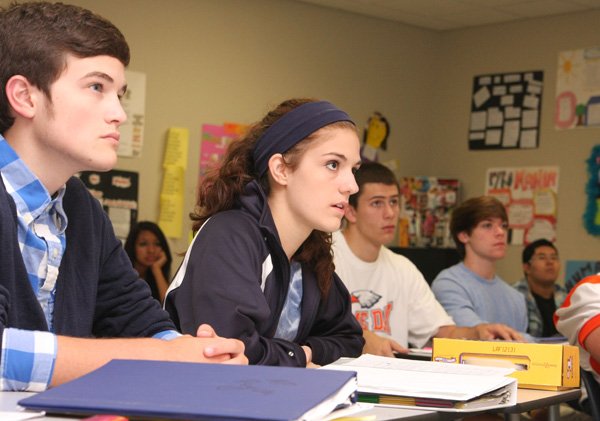School-level support will carry on a statewide program that once helped districts pay to increase student participation in math, science and English Advanced Placement classes, according to Northwest Arkansas administrators.
The $100 incentives paid to students and teachers for passing Advanced Placement scores are gone, but the support for schools and teachers is still there, said Tommie Sue Anthony, outgoing president of the Arkansas Advanced Initiative for Math and Science, a private organization.
At A Glance
Five Years Of Growth
The Arkansas Advanced Initiative for Math and Science supports 10 Advanced Placement tests in math, science and English, but in the past five years the number of students taking Advanced Placement classes and tests has grown at participating schools.
2013 studentsPercent increase in students over 5 years 2013 examspercent increase in exams over five years8percent increase in pass rate over five years
• Har-Ber High School
657,113.2 percent1,199122 percent
Springdale High School
631, 176.3 percent1,112209.4 percent
Rogers High School
667, 160.7 percent1,223161.8 percent
Heritage High School
601, 291.7 percent1,226372.6 percent
Arkansas
25,196*131.4 percent43,916140 percent
Global
2,225,647*131 percent3,955,733134.4 percent
Source: District reports from the College Board
Grants gave the initiative money to start teacher training programs in Arkansas; host area-wide workshops with out-of-state teacher consultants to speak to students; and award $100 gift cards for students passing Advanced Placement tests with a score of 3, 4 or 5. Teachers were given $100 for each of their student’s passing scores and stipends for meeting certain goals.
The program left a legacy to Rogers students, said Robert Moore, assistant superintendent for secondary curriculum and instruction. Rogers students were required to sign contracts, complete summer reading and have a parent meeting, before the district’s participation in the initiative. Now all students can and should be a part of the Advanced Placement program, Moore said.
“(The initiative) forced us to look at how we expand this program and support (students) along the way,” Moore said.
Springdale was a pilot district with the program, reporting its first scores in 2008-2009. Rogers joined the program a year after Springdale, reporting its first scores in 2009-2010, according to records.
Anthony hopes districts continue the Saturday study sessions that brought expert teachers in to speak.
“It’s a critical piece,” Anthony said.
The study sessions offer the equivalent to 12 extra days in class, Anthony said, and students benefited from hearing different speakers.
District administrators said planning extra study sessions will be between Advanced Placement teachers and their principals.
“We don’t want it to be a Saturday,” said Kim Garrett, Springdale assistant superintendent for teaching and learning for grades eight through 12.
Teachers will have more flexibility to schedule their own meetings with students and the extra study sessions will start earlier in the year, Garrett said.
Rogers officials are working on plans to support the program, Moore said.
The Arkansas Advanced Initiative for Math and Science will continue to operate on a streamlined budget, Anthony said. The program will offer training for teachers, and support, but not the performance-based awards for students and teachers.
“We had a lot of teachers who drew down a lot of money,” Anthony said.
Administrators at Springdale schools would like to keep giving student rewards and are looking for a grant or corporate sponsorship. The program worked, Garrett said.
“We have not given up hope,” she said.
Rogers students were awarded $46,500 through the state initiative last week, Moore said, and it would be difficult to raise that kind money for the growing program. There will be some kind of recognition, he said, perhaps like the lunch trip Rogers schools have now for students with high Advanced Placement scores outside the state rewards program.
Rewards from the Arkansas Advanced Initiative for Math and Science were given in 10 math, science and English classes.
The program wasn’t meant to support all Advanced Placement classes, but focus on skills such as science and math, Anthony said.
About 26,000 Arkansas students took Advanced Placement tests last spring, according to reports from the College Board. State money pays for students to take the exams in Arkansas. Students can earn college credit with a score of 3, 4 or 5 on the tests. Rogers and Springdale administrators said the experience of taking the class better prepares students for college whether they score high enough to earn the credit or not.
Pass rates in some initiative-supported tests were higher than state average.
Biology was the most challenging test for the Arkansas class of 2012 with 18.3 percent of the 2,257 seniors earning scores high enough to get college credit for the class at some point during high school.
Students at Har-Ber High School in Springdale tested at double the state average this spring with a 42.4 percent pass rate; Springdale High School had a 46.1 percent pass rate. Heritage High School in Rogers had a 45.6 percent pass rate and Rogers High School saw 65.2 percent of students scoring high.
Garrett compares preparing students for a test to a football game.
When football players go out, they know exactly what that game is going to look like,” she said.
The coach preps his team by explaining what they will face and how to overcome it, Garrett said.
“It’s the same in academics,” she said.

